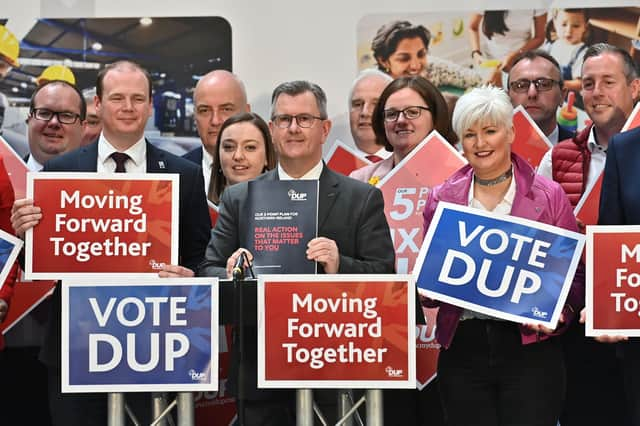Jamie Bryson: The Northern Ireland Protocol Bill does not meet the DUP’s seven key tests


It said the Northern Ireland Protocol Bill was “only enabling legislation”.
In addition, speaking to the press Sir Jeffrey said that the DUP were not going to be taking anything on trust.
This, on its face, may seem innocuous enough. Not so.
Advertisement
Hide AdAdvertisement
Hide AdIn accepting the NI Protocol Bill is only enabling legislation, in effect a framework, the DUP are plainly accepting that the bill receiving Royal Assent, in of itself, is not enough to restore power sharing.
How could it ever be?
The DUP have made clear that power sharing can only be restored when there is a solution to the protocol which meets their seven key tests.
A bill which is only enabling legislation may well provide the framework within which those key tests can be met, but it does not itself meet them.
And if it does meet them, then unless the DUP are going to operate on trust that the enabling powers will be used in an acceptable manner (and they have said they are not taking anything on trust) the passage of the bill into law is not enough to restore power sharing.
Advertisement
Hide AdAdvertisement
Hide AdThat position is consistent, in my view, with the commitment the DUP made to the unionist electorate who overwhelmingly endorsed their message, and that of the TUV, which made clear that it was a binary choice between power sharing and the protocol.
The ‘seven key tests’ should be supplemented by a preliminary three-stage test in relation to the bill.
• Firstly, the bill — at the very least unaltered but preferably strengthened — must pass through both Houses of Parliament and receive Royal Assent.
• Secondly, all the core provisions of the bill (with specific focus on those parts which strip the most constitutionally offensive parts of the protocol out of domestic law at the point of commencement) must be the subject of the necessary commencement order, bringing them into effect.
Advertisement
Hide AdAdvertisement
Hide AdIt should be remembered that absent a commencement order the Bill has no effect, as only the final provisions of the Bill come into force at Royal Assent.
• Thirdly, the enabling provisions — once brought into effect — must be used to lay regulations to replace that which the Protocol Bill (which will be called an Act once it receives Royal Assent) excludes from domestic law. These regulations must be consistent with the Acts of Union.
It is only once the preliminary three-stage test is passed, can the DUP’s seven key tests — endorsed by the unionist electorate — be considered against the new arrangements.
In advance of that point in time, it would be absurd for unionism to surrender the leverage of refusing to enter power sharing.
Advertisement
Hide AdAdvertisement
Hide AdThe whole basis of the government’s necessity argument is founded upon the damage the protocol has done to power sharing, and potentially to peace.
To go back and operate power sharing, in the absence of the protocol being removed, would remove that foundation of the argument as to why it is necessary to act.
It would fatally undermine unionism’s objective.
It is for that reason the Ulster Unionist Party’s response to Liz Truss’ election as Tory leader was so shockingly misconceived.
In the first instance, they once again stepped across the unionist picket line and urged a return to power sharing in advance of any decisive action. This is wildly out of step with the unionist electorate (as evidenced by the election and recent polls), but moreover is just fundamentally silly.
However, worse was to come.
Advertisement
Hide AdAdvertisement
Hide AdThe UUP then urged “negotiation” with the EU, rather than confrontation.
The protocol has subjugated Northern Ireland’s place within the Union (that is so on the UUP’s own logic, unless they are to disavow the late David Trimble’s view that “the Act of Union is the Union”).
This is a constitutional abomination, and at the apex of the EU’s ill-gotten gains, achieved in part due to the disgraceful threats of IRA terrorism which was used as political leverage by some.
To negotiate means accepting the legitimacy of the status quo as a starting point.
Advertisement
Hide AdAdvertisement
Hide AdThat means the EU benefit from the gains they should not have, and we work backwards from there seeking compromise.
If a burglar robs your house, you do not ‘negotiate’ for some of your possessions back, thus allowing the plunderer to benefit from his wrongful actions.
In the same vein, there is nothing to negotiate with the EU.
The protocol must go, and until it does, there is no basis for power sharing in Northern Ireland.
Advertisement
Hide AdAdvertisement
Hide Ad• Jamie Bryson is a unionist activist and author of NI Constitutional Law: Acts of Union and NI Protocol
• Ben Lowry is editor of the Belfast News Letter (that is Belfast Northern Ireland, not Belfast Maine)
• Ben Lowry Sep 7: Boris Johnson wanted to be king of the world, so maybe he is first eyeing the White House
• Ruth Dudley Edwards Sep 6: Truth is the weapon to use against the lies of the IRA
Advertisement
Hide AdAdvertisement
Hide Ad• Henry McDonald Sep 6: Unionists should tread carefully over trust in Truss
• Editorial Sep 6: Warm congratulations to our latest PM, Liz Truss, now time to deliver for NI
• Owen Polley September 5: New PM needs to ignore latest EU threats over NI
• Ben Habib Sep 5: Protocol is not just a threat to NI, but to the whole of the UK
• Ben Lowry Sep 3: London will never treat SF as harshly as it will unionists